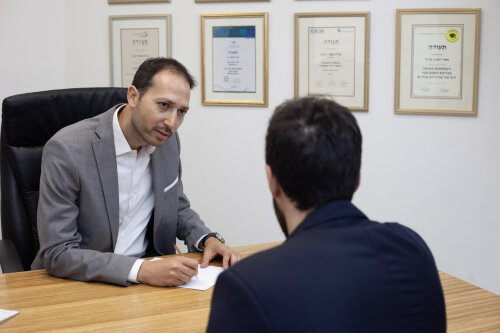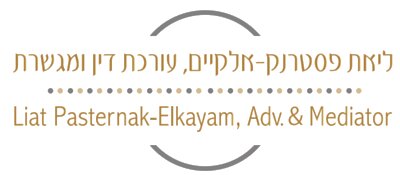Best Estate Planning Lawyers in Jerusalem
Share your needs with us, get contacted by law firms.
Free. Takes 2 min.
List of the best lawyers in Jerusalem, Israel
About Estate Planning Law in Jerusalem, Israel
Estate planning in Jerusalem, Israel involves legally preparing for the management and distribution of an individual’s assets and responsibilities in the event of their incapacity or death. This typically includes creating and updating wills, trusts, and other legal documents to ensure one's instructions are followed and legal requirements are met. It is important to be aware that estate planning in Israel may have nuances and requirements that differ from those in other countries, making it advisable to seek specialized legal assistance.
Why You May Need a Lawyer
There are several scenarios where seeking legal help for estate planning becomes essential:
- Drafting and updating a comprehensive will
- Setting up trusts for minor children or charitable purposes
- Navigating inheritance laws, especially in blended families or complicated family structures
- Ensuring tax efficiency in asset transfer
- Managing foreign assets and addressing cross-border inheritance issues
- Handling disputes among beneficiaries
- Planning for medical directives and durable powers of attorney
Local Laws Overview
Jerusalem, as part of Israel, follows the Israeli Inheritance Law of 1965, which lays down the legal framework for estate planning in the country. Key aspects include:
- Israel adheres to testamentary freedom, meaning individuals can generally distribute their estate as they wish through a will.
- In the absence of a will, the estate is divided according to the rules of intestate succession under Israeli law. Typically, the spouse and children of the deceased are the primary successors.
- A legally valid will can be holographic, oral (in specific circumstances), or written, and must comply with certain formalities such as being signed in the presence of witnesses.
- Israeli law also provides for spouse protection, including rights to the marital home and maintenance.
- Cross-border estates require special considerations, particularly for assets located outside of Israel or heirs who reside abroad.
Frequently Asked Questions
1. What happens if I die without a will in Jerusalem, Israel?
If an individual dies without a will, their estate will be distributed according to intestacy laws. Typically, the estate will be divided among the spouse and children, or other relatives if there are no immediate family members.
2. Can I disinherit a family member in my will?
Yes, Israeli law allows for testamentary freedom, allowing individuals to distribute their estate as they see fit, including disinheriting certain family members. However, certain protections are in place, particularly for spouses and minor children.
3. What is a living will, and can I create one in Israel?
A living will details your wishes regarding medical treatment in the event you are unable to communicate them. Yes, you can create a living will in Israel, which will be honored as long as it complies with legal standards.
4. Are there inheritance taxes in Israel?
Currently, there is no inheritance tax in Israel. However, other taxes may apply, such as capital gains tax on the sale of inherited property.
5. How do I ensure my will is legally valid in Israel?
To ensure your will is legally valid, it must be in writing, signed by you, and witnessed by two individuals who are not beneficiaries. Holographic and oral wills have additional specific requirements.
6. Can I appoint a guardian for my minor children in my will?
Yes, you can appoint a guardian for your minor children in your will. This person will be responsible for their care if both parents pass away.
7. What should I do if I want to contest a will?
If you believe a will should be contested, you must file a claim in the appropriate probate court, presenting evidence of issues like lack of testamentary capacity or undue influence.
8. What is a durable power of attorney?
A durable power of attorney allows you to appoint someone to make decisions on your behalf if you become incapacitated. It remains in effect even if you are unable to make decisions yourself.
9. How do I incorporate foreign assets into my estate plan?
Dealing with foreign assets requires careful consideration of both Israeli and foreign law, potentially involving multiple jurisdictions. Consulting with an experienced lawyer is crucial in such cases.
10. How often should I update my estate plan?
It is advisable to review and potentially update your estate plan every few years or after significant life changes, such as marriage, divorce, the birth of a child, or acquiring substantial new assets.
Additional Resources
For additional help and information related to estate planning in Jerusalem, consider the following resources:
- The Israel Bar Association (IBA) - provides resources and a directory of qualified estate planning lawyers.
- The Ministry of Justice’s Administrator General and Official Receiver - offers guidance on inheritance laws and processes.
- Non-profit organizations such as Yad Vashem, which provide information on managing estates with philosophical or charitable intentions.
Next Steps
If you need legal assistance with estate planning in Jerusalem, Israel, consider taking the following steps:
- Identify and document your estate planning goals and needs.
- Compile a list of your assets, liabilities, and key personal information.
- Schedule consultations with several estate planning attorneys to find one who understands your unique situation.
- Prepare to ask specific questions about their experience with cases similar to yours.
- Review all drafted documents carefully and ensure they reflect your wishes accurately.
By taking these steps, you can ensure that your estate is managed according to your wishes and that your loved ones are provided for after your passing.
Lawzana helps you find the best lawyers and law firms in Jerusalem through a curated and pre-screened list of qualified legal professionals. Our platform offers rankings and detailed profiles of attorneys and law firms, allowing you to compare based on practice areas, including Estate Planning, experience, and client feedback.
Each profile includes a description of the firm's areas of practice, client reviews, team members and partners, year of establishment, spoken languages, office locations, contact information, social media presence, and any published articles or resources. Most firms on our platform speak English and are experienced in both local and international legal matters.
Get a quote from top-rated law firms in Jerusalem, Israel — quickly, securely, and without unnecessary hassle.
Disclaimer:
The information provided on this page is for general informational purposes only and does not constitute legal advice. While we strive to ensure the accuracy and relevance of the content, legal information may change over time, and interpretations of the law can vary. You should always consult with a qualified legal professional for advice specific to your situation.
We disclaim all liability for actions taken or not taken based on the content of this page. If you believe any information is incorrect or outdated, please contact us, and we will review and update it where appropriate.















